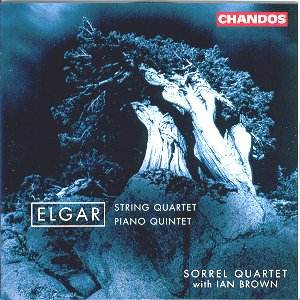Edward ELGAR
String Quartet Op. 83
Piano Quintet Op.84
 Ian Brown {piano)
Ian Brown {piano)
Sorrel Quartet
rec 2000
 CHANDOS CHAN 9894
[64.37]
CHANDOS CHAN 9894
[64.37]
Crotchet AmazonUK
AmazonUS

Gone are the days when these works, either singly or as a coupling, were
absent from the catalogues. The best of course, as far as the Piano Quintet
is concerned, is the Cohen/Stratton version transferred to CD back in
1993. Since then there have been new versions on EMI (LSO soloists), and
on several budget labels such as Edition Abseits, Discover International
and Naxos. Chandos have now released the pair with the exciting young Sorrel
quartet and the versatile, experienced pianist Ian Brown. The result is superb.
The First World War was a dreadful time for Elgar and a watershed for his
career, especially his international reputation, whilst his health was also
not good. Lady Elgar found Brinkwells, an isolated cottage near Petworth
in Sussex, where her husband could escape from the rigours of wartime London.
He began to compose chamber music, something he had neglected for thirty
years, though in 1907 he had begun to write a String Quartet for Adolph
Brodsky's quartet. Nothing came of it (or more accurately some of its material
went into The Music Makers or the First Symphony) until 1918 when
Elgar completed this work, dedicated to Brodsky, but first performed in public
by W.H. Reed, Albert Sammons, Raymond Jeremy and Felix Salmond at the Wigmore
Hall on 21 May 1919. Chamber music is sometimes produced or rediscovered
by composers at the end of their lives, Bruch did it too, and often a poignant
restless mood or one of solemn repose pervades the music which they produce.
Each of the three movements in this quartet fits such a bill, though the
impassioned finale has much of the orchestral Elgar in it. The Sorrel Quartet
give an excellent account of the work, wistful in the slow movement (most
favoured by Lady Elgar and played at her funeral just one year later), vibrantly
energetic in the virtuosic finale with impressive unity of ensemble. The
Quartet's leader Gina McCormack has no restraint (quite rightly too) in
exploiting violinistic effects such as portamento, harmonics etc and gives
a dazzling display of her considerable technique, inspiring her colleagues
right to the last chord in a tightly knit yet expansively sensitive, well-paced
account of a work which is frankly hard to bring off convincingly.
The Piano Quintet also has the same air of melancholy as the quartet,
stemming no doubt from his concurrent work on the cello concerto which was
next to come, though it tends to more eerie moments - apparently a group
of dead trees near the cottage affected Elgar when writing the piece in 1919,
'a ghastly sight in the evening'. The work is notable (and notably performed
too) for its ebb and flow of rubato as well as its varied moods. The sublime
Adagio drew the best music from Elgar and therefore the best from
these players (with some particularly luscious phrases from violist, Sarah-Jane
Bradley and cellist, Helen Thatcher) in an exquisitely balanced and above
all stylish performance. No less memorable are the brilliantly coloured
guitar-like effects towards the end of the first movement and the Spanish
element which Reed likened to a local legend of monks in the area but which
is now pretty convincingly debunked and attributed to Elgar's friend Algernon
Blackwood, a writer of ghost stories. The finale, with its cyclical references
to the first movement, is given both passion and subdued sensitivity true
to the Elgarian idiom.
This is exciting playing of the highest order, always touchingly involved
and, above all, deeply committed. I thoroughly recommended the disc.
Christopher Fifield
See also review by Simon
Foster

